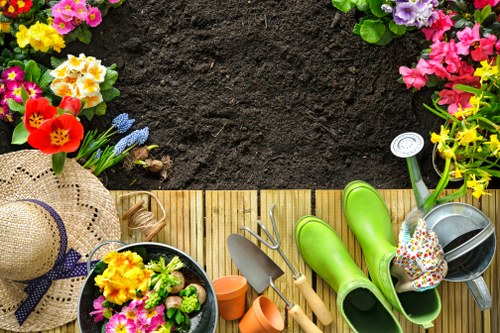Comprehensive Guide to Garden Maintenance in Cleaners E17
Introduction to Garden Maintenance

Maintaining a beautiful garden requires consistent effort, knowledge, and the right tools. In the bustling area of Cleaners E17, homeowners and garden enthusiasts alike seek effective strategies to keep their green spaces thriving throughout the year.
Whether you are a seasoned gardener or a beginner, understanding the fundamentals of garden maintenance can transform your outdoor area into a serene and vibrant sanctuary.
In this article, we will explore essential garden maintenance practices tailored specifically for the Cleaners E17 region, ensuring your garden remains lush and healthy.
Understanding the Climate of Cleaners E17

The climate in Cleaners E17 plays a pivotal role in determining the types of plants that will thrive and the maintenance routines required. With mild winters and warm summers, the region offers a conducive environment for a diverse range of flora.
However, seasonal variations such as occasional heavy rains or dry spells necessitate specific gardening techniques to adapt and maintain plant health.
By comprehensively understanding the local climate, gardeners can make informed decisions about plant selection, watering schedules, and protective measures against pests and diseases.
Essential Tools for Garden Maintenance

Having the right set of tools is fundamental to efficient garden maintenance. Equip yourself with:
- Pruning Shears: For trimming and shaping plants.
- Garden Fork: Ideal for aerating soil and removing weeds.
- Watering Can or Hose: Ensures plants receive adequate hydration.
- Gloves: Protect your hands from thorns and rough vegetation.
- Lawn Mower: Keeps your lawn neat and well-maintained.
Investing in high-quality tools not only makes maintenance tasks easier but also enhances the longevity of your gardening equipment.
Plant Selection for Cleaners E17 Gardens

Choosing the right plants is crucial for a thriving garden. Consider the following factors:
- Soil Type: Assess whether your soil is sandy, clayey, or loamy to select compatible plants.
- Sunlight Exposure: Determine areas with full sun, partial shade, or full shade.
- Water Requirements: Match plants with your watering capacity and climate conditions.
- Maintenance Level: Decide between low-maintenance or high-maintenance plants based on your availability.
- Ornamental Value: Select plants that enhance the aesthetic appeal of your garden.
Popular choices for Cleaners E17 include perennials like lavender, roses, and ornamental grasses that are well-suited to the local climate.
Soil Health and Fertilization

Healthy soil is the foundation of a flourishing garden. Regularly testing your soil can help identify nutrient deficiencies and pH imbalances.
Implementing a balanced fertilization schedule ensures that plants receive necessary nutrients. Organic fertilizers, such as compost and manure, are excellent choices for enhancing soil fertility naturally.
Additionally, incorporating mulch can retain soil moisture, suppress weeds, and regulate soil temperature, contributing to overall plant health.
Watering Strategies for Optimal Growth
Effective watering is critical in garden maintenance. Overwatering can lead to root rot, while underwatering stresses plants.
Adopt the following strategies:
- Deep Watering: Encourage deep root growth by watering thoroughly at the base of plants.
- Early Morning Watering: Reduces evaporation and minimizes fungal diseases.
- Drip Irrigation: Provides consistent moisture directly to the roots, conserving water.
Adjust your watering schedules according to seasonal changes to maintain optimal soil moisture levels.
Pest and Disease Management
Maintaining a healthy garden involves proactive pest and disease control. Regular inspections help identify issues early.
Use integrated pest management (IPM) techniques, such as:
- Biological Controls: Introduce beneficial insects that prey on common garden pests.
- Organic Pesticides: Utilize eco-friendly solutions to manage infestations without harming the environment.
- Cultural Practices: Rotate crops and remove diseased plant debris to prevent pest proliferation.
Staying vigilant and adopting sustainable practices ensures a resilient garden ecosystem.
Pruning and Trimming Techniques
Regular pruning and trimming are essential for plant health and aesthetic appeal. Proper techniques include:
- Sanitary Pruning: Remove dead or diseased branches to prevent the spread of infections.
- Shape Maintenance: Trim plants to maintain their desired form and encourage bushier growth.
- Balanced Cutting: Ensure even pruning to avoid stressing the plant.
Using sharp, clean tools and following plant-specific guidelines will yield the best results in your garden maintenance efforts.
Lawn Care Essentials
A well-maintained lawn enhances the overall look of your garden. Key lawn care practices include:
- Mowing: Keep grass at an optimal height to promote healthy growth.
- Edging: Define garden beds and pathways for a neat appearance.
- Aeration: Improve soil aeration to enhance root development and water infiltration.
- Overseeding: Fill in bare patches and improve lawn density.
Regular lawn maintenance ensures a vibrant and resilient turf that complements your garden.
Seasonal Garden Maintenance Tips
Adapting your garden maintenance routine to seasonal changes is crucial for year-round garden health.
Spring: Focus on planting new blooms, fertilizing, and preparing garden beds for the growing season.
Summer: Emphasize watering, weeding, and pest control to sustain plant vitality during dry periods.
Autumn: Conduct soil testing, mulch application, and pruning to prepare plants for winter.
Winter: Protect sensitive plants, clean garden tools, and plan for the upcoming gardening year.
Organic Gardening Practices
Embracing organic gardening not only benefits your health but also promotes environmental sustainability.
Implement the following practices:
- Composting: Recycle kitchen scraps and garden waste into nutrient-rich compost.
- Natural Pest Repellents: Use garlic, neem oil, or other natural substances to deter pests.
- Crop Rotation: Prevent soil depletion and reduce pest infestations by rotating plant families.
- Companion Planting: Grow mutually beneficial plants together to enhance growth and reduce pests.
Adopting organic methods leads to a healthier garden ecosystem and reduces reliance on chemical inputs.
Mulching for Garden Health
Mulch serves multiple functions in garden maintenance, including moisture retention, weed suppression, and soil temperature regulation.
Benefits of mulching:
- Water Conservation: Reduces the frequency of watering by maintaining soil moisture.
- Weed Control: Prevents weed seeds from germinating by blocking sunlight.
- Soil Protection: Shields the soil from erosion and compaction.
- Nutrient Addition: Organic mulches decompose and enrich the soil with nutrients.
Choose appropriate mulch types, such as bark, straw, or compost, based on your garden needs.
Maintaining Garden Pathways and Structures
Pathways and garden structures like pergolas, fences, and trellises add functionality and charm to your garden.
Maintenance tips include:
- Regular Cleaning: Remove debris and weeds from pathways to keep them clear and attractive.
- Structural Repairs: Inspect and fix any damage to garden structures to ensure safety and longevity.
- Preservation: Apply sealants or protective coatings to wooden structures to prevent rot and decay.
Well-maintained pathways and structures enhance the usability and visual appeal of your garden space.
Incorporating Sustainable Practices
Sustainability in garden maintenance promotes environmental stewardship and resource efficiency.
Key sustainable practices include:
- Rainwater Harvesting: Collect and utilize rainwater for irrigation to conserve water resources.
- Native Planting: Grow indigenous plants that are well-adapted to the local climate and require less maintenance.
- Energy-Efficient Tools: Use solar-powered or manual gardening tools to reduce energy consumption.
- Waste Reduction: Minimize garden waste through composting and recycling.
Implementing these practices leads to a more resilient and eco-friendly garden.
Conclusion: Achieving a Thriving Garden in Cleaners E17
Effective garden maintenance in Cleaners E17 involves a combination of understanding local climate, selecting appropriate plants, utilizing the right tools, and adopting sustainable practices.
By following the guidelines outlined in this article, you can ensure that your garden remains a beautiful and healthy extension of your home.
Embark on your garden maintenance journey today and transform your outdoor space into a lush, vibrant haven.
Contact us today to learn more about tailored garden maintenance services that can help your garden thrive year-round.


